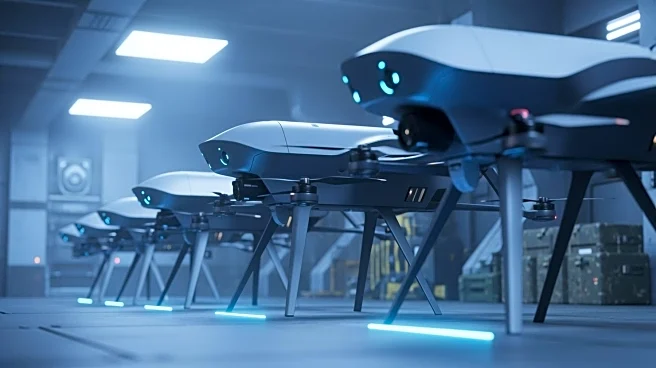What's Happening?
The United Kingdom has delivered over 85,000 unmanned aircraft systems (UASs) to Ukraine in the past six months, as announced by UK Secretary of State for Defence John Healey. This delivery is part of a larger
commitment to supply 100,000 UAVs by April 2026, supported by a GBP350 million investment into unmanned systems for Ukraine. The UASs include short-range first-person view (FPV) UAVs for precision attacks, interceptor UAVs for air defense, and new fiber-optic UAVs. The UK and Ukraine have also signed an industrial partnership to develop the Octopus interceptor UAV, which is already in use in Ukraine.
Why It's Important?
The substantial delivery of UASs underscores the UK's commitment to supporting Ukraine in its defense against Russian aggression. These systems enhance Ukraine's military capabilities, particularly in precision attacks and air defense, which are crucial in countering Russian advances. The industrial partnership between the UK and Ukraine signifies a strategic collaboration that could lead to further technological advancements and increased military effectiveness. This support not only strengthens Ukraine's defense but also reflects broader international efforts to counter Russian influence and aggression in the region.
What's Next?
The ongoing delivery of UASs and the development of the Octopus interceptor UAV suggest continued military collaboration between the UK and Ukraine. As the conflict persists, the focus will likely be on enhancing Ukraine's defense capabilities through technological innovation and strategic partnerships. The international community will be watching closely to see how these developments impact the conflict's dynamics and whether they lead to shifts in military strategy or diplomatic negotiations.
Beyond the Headlines
The ethical considerations of supplying advanced military technology to a nation in conflict are significant, as they involve balancing support for sovereignty with the potential for escalation. The partnership between the UK and Ukraine also highlights the role of international collaboration in addressing global security challenges. The long-term implications of these developments could influence future military alliances and technological advancements in defense systems.









